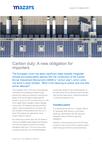Download newsletter
The European Union (EU) has a long-standing commitment to combating climate change, primarily by reducing emissions of greenhouse gases. Until less stringent climate policies prevail in many non-EU countries, there is a risk of so-called carbon leakage. Carbon leakage occurs when EU-based companies shift their carbon-intensive production to countries with less stringent climate policies than the EU, or when EU products are replaced by more carbon-intensive imports.
By introducing a carbon duty, the EU seeks to remove competitive advantages that importers who are not subject to strict environmental standards might have. This is to ensure that European producers are not disadvantaged concerning imports of high-emitting goods. At the same time, the EU believes that the carbon duty will also help cleaner industrial production in countries outside the EU.
Transition period
The transitional period from 1 October 2023 to 31 December 2025 will be for information gathering, which means that the importer´s obligations will be limited to reporting obligations.
Importers of these goods into the EU will have to report on the volume of their imports and the greenhouse gas emissions produced during their production, without any financial payments or adjustments.
CBAM will initially apply to the import of certain goods whose production is the most carbon-intensive and exposed to the greatest risk of carbon leakage. Such goods include:
- Cement
- Iron and steel
- Aluminum
- Fertilisers
- Electricity
- Hydrogen
The transition phase serves as a learning period for all stakeholders (importers, manufacturers, and control authorities). It will enable the European Commission to gather useful information on embedded emissions to refine the methodology for the definitive period starting in 2026.
Go-live system
The effectiveness of the system from 2026 will introduce the obligation of importers to declare the quantity of goods and the amount of embedded emissions in the total goods that they imported into the EU in the previous year. They will then hand over the corresponding number of CBAM certificates.
We also draw attention to the possibility of obtaining additional information on the issue of carbon duty through webinars organized by the European Commission, the recordings are available on its website.
If you are interested in the issue or need further information, please do not hesitate to contact us.
Download newsletter







